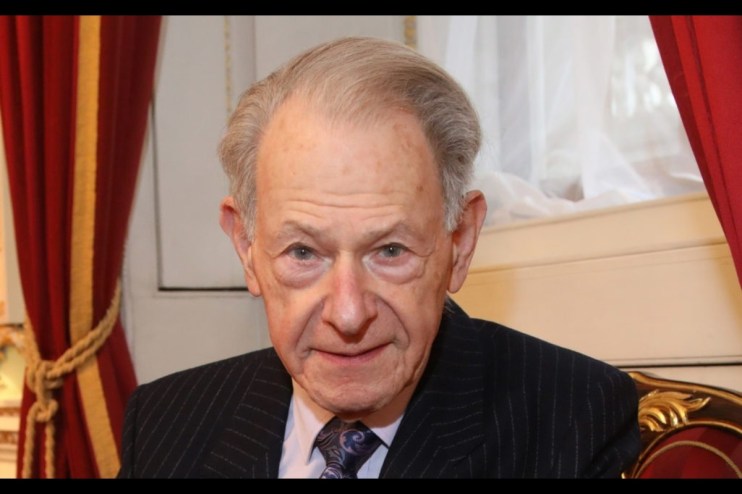This Holocaust Memorial Day, remembering is more important than ever

The Holocaust is harrowing lesson in what humanity is capable when intolerance is left unchallenged. Survivor John Hajdu confronts those who still deny his suffering
In October 1944, the far-right Hungarian Arrow Cross party, collaborating with the Nazis, began hunting down Jewish women and children, having already taken the men. By this time my father was in a forced labour camp. As they searched block by block in Budapest, raiding every flat, my mother was taken to Mauthausen concentration camp. I survived only because a kind non-Jewish neighbour hid my aunt and me inside his cupboard. Later, my family and I were forced into the Budapest ghetto, where we endured unimaginable conditions. Though I was only seven years old, I vividly remember the stench, the starvation and the constant terror of not knowing whether each day would be my last.
The Budapest ghetto was a closed-off area designated for Jews, surrounded by an imposing wall and guarded by SS troops, who ruthlessly enforced Nazi ideology through violence and terror. It housed over 65,000 Jews who had not yet been deported to concentration camps. In 290 buildings, each flat was overcrowded, with at least 15 people crammed into a single space. We survived on meagre rations of horsemeat and bread, and water had to be brought up in buckets. I was always hungry. There was no electricity, no medicine and no cleaning materials. It was hell on earth.
How could I forget the countless bodies lying in the streets, victims of starvation and diseases like typhoid, dysentery and tuberculosis? Rubbish was never collected, making even basic living an impossible nightmare with dozens of people dying every day. Dead bodies were everywhere – and no one came to collect them. Yet, there are still those who deny the Holocaust, one of the most horrific crimes in human history. The evidence of this genocide is undeniable – preserved through countless survivor testimonies, archival records, photographs and the physical remnants of concentration and death camps such as Auschwitz, Treblinka, and Dachau.
Our buildings were under constant bombardment by the advancing Russian airforce. Part of our building collapsed and we were incredibly fortunate not to be killed by the bomb or the rubble that fell on top of us. I also remember the random shootings: innocent people were dragged to the banks of the Danube, shot, and then left to tumble lifelessly into the river. The river became a silent witness to the brutality and inhumanity of the Nazis, its currents carrying away the evidence of their atrocities.
On 17 January 1945, just minutes before the retreating Nazis were about to blow up the ghetto they had rigged with explosives, Russian troops arrived and freed us. They found 3,000 bodies, a grim reminder of the evil that had permeated every corner of the ghetto. My story, in a small way, illustrates the atrocities committed by the Nazis and the incredible suffering of Hungarian Jews. It is my duty as a survivor to share my testimony with as many school children and adults as possible, for those who did not survive.
As a survivor, I find it impossible to fully convey the depth of my emotions when faced with Holocaust denials or distortions. For me, it feels like being persecuted all over again, a fresh wound over a scar that never fully healed.
The Holocaust is not only history; it is my life story, a very personal pain. When people try to rewrite history, they minimise our suffering. Holocaust denial undermines the truth that is essential to ensuring such atrocities should never be forgotten. This is why I am proud to work with the Holocaust Memorial Day Trust and applaud their commitment to Holocaust education and commemoration.
The Holocaust is not only history; it is my life story, a very personal pain. When people try to rewrite history, they minimise our suffering
This is why every time someone tries to deny the Holocaust, they are not just disputing historical facts; they are erasing the humanity of six million Jews who were killed simply because of their identity. They are denying the experiences of others – like Roma, homosexuals, people with disabilities, black people, and others – who were also deemed unworthy of life by the Nazis. The consequences of Holocaust denial and distortion extend far beyond mere historical revisionism: they embolden those who seek to promote hate, bigotry, and intolerance in our society.
As a Holocaust survivor, it is my duty to challenge any attempts to downplay our suffering or erase Nazi atrocities and invalidate the profound loss we still carry. The Holocaust is a stark reminder of what can happen when intolerance is allowed to flourish unchallenged. Those who deny this reality contribute to an environment where such evils can rise again. It is therefore crucial to challenge Holocaust denial and educate current and future generations about the horrors of the past.
John Hajdu MBE is a Holocaust survivor